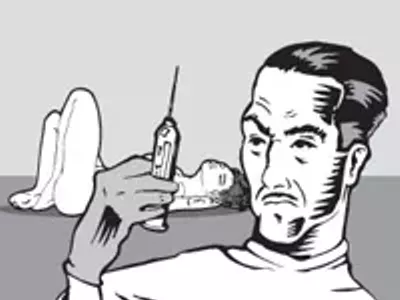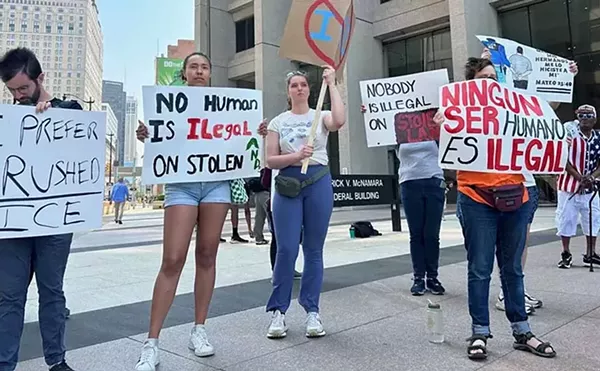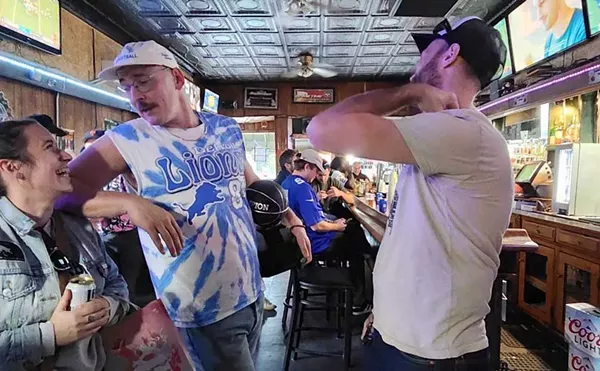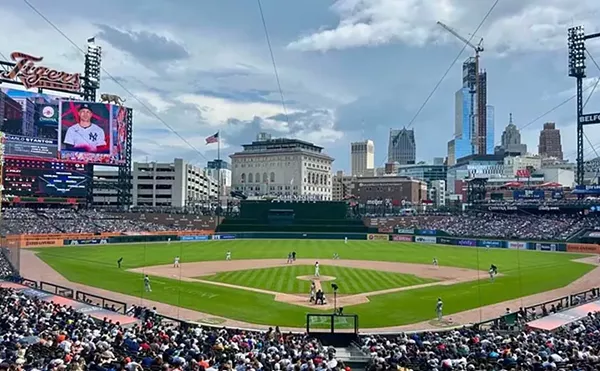
Audio By Carbonatix
[
{
"name": "GPT - Leaderboard - Inline - Content",
"component": "35519556",
"insertPoint": "5th",
"startingPoint": "3",
"requiredCountToDisplay": "3",
"maxInsertions": 100,
"adList": [
{
"adPreset": "LeaderboardInline"
}
]
}
]
The battlefields are public opinion, the courts, Congress and state legislatures. And gay, lesbian, bisexual and transgendered activists point to strategic victories — plus the promise of more — despite well-publicized setbacks.Recent successes include the U.S. Supreme Court ruling that state laws banning sodomy are unconstitutional. On the political front, the three U.S. senators running for president — Democrats Hillary Clinton and Barack Obama and Republican John McCain — voted against a constitutional ban on same-sex marriage. According to opinion polls, younger people are more supportive of gay rights issues than older folks, suggesting a future shift in public policy.
But failures are front and center too. During the last 13 years, 33 states have enacted statutes banning marriage between same-sex couples, for example, and Congress failed to classify anti-gay assaults as federal hate crimes and did not prohibit anti-gay job discrimination in legislation last year. And there's still the U.S. military's "don't ask, don't tell" policy.
Still, having GLBT issues discussed in presidential campaigns, an increase in GLBT student groups on campuses, and a record high acceptance of gay rights in opinion polls are promising signs to the movement.
Sue Hyde, conference director with the National Gay and Lesbian Task Force in Cambridge, Mass., says, "In the 20 years since we were founded, I think the most significant change we've seen is that our movement has grown and flourished in every city of any significant size in every state in this country and come forward as one of the very significant social justice advocacy movements in the history of our country. ... I think the LGBT political movement has become widely recognized as a force to be reckoned with in the political context and has a cultural presence that really can't be ignored."
Beginning today, Hyde is leading the charge from Detroit. About 2,000 people from throughout the United States and at least three other countries are attending the National Conference on LGBT Equality: Creating Change at the Renaissance Center through Sunday. It's the 20th annual event.
The dozens of session topics include practical strategies, such as how to organize a community, advocate effectively on issues and engage youth in activities. Other sessions will address aging, class, elections, faith, health, immigration, veterans, research and workplace issues relevant to LGBT people.
Corporate sponsors are American Airlines, Showtime, Bacardi and Wells Fargo.
Detroit was chosen, Hyde says, because of the strength of LGBT community here as evidenced by groups like Triangle Foundation, the Ruth Ellis Center (a shelter for runaway and homeless LGBT teens in Highland Park) and Affirmations Community Center in Ferndale.
But the 2004 state ballot measure that resulted in a constitutional amendment banning same-sex marriage also drew interest to Michigan, Hyde says, if not in a positive way. The attention continues as the issue winds through the state courts. Last year, the state Court of Appeals ruled that the amendment also prohibited public employers from offering domestic partner benefits. The state Supreme Court heard oral arguments last year and is expected to issue a decision in the coming months.
"We're still coming out of a bit of slump from 2004 [when the constitutional amendment passed in Michigan]. The world did not crumble. We're still here," says Kate Runyon, interim executive director of the Triangle Foundation and one of the conference's local co-chairs.
Other legislation in Lansing particularly pertinent to the GLBT community is the second-parent adoption bill, which would allow two unmarried adults to legally adopt a child. It would change the current law, which restricts adoption to married, female-male couples or to a single person who could be straight, bisexual or gay.
Rep. Paul Condino (D-Southfield) introduced it last year and it remains in the judiciary committee.
The state House also is considering a bill that would outlaw GLBT discrimination in employment, housing and public accommodations and the state Senate has a hate crimes measure.
Wayne State University law professor Robert Sedler calls the LGBT movement the new "frontier" for the civil rights movement.
"It's no longer acceptable to make racist or sexist remarks, but in a number of contexts you will hear homophobic remarks or thinly disguised homophobic remarks because it's still acceptable in certain circles to be anti-gay and anti-lesbian," he says.
Changing opinions
Advocates say it's only a matter of time before they have fewer policy fights. The GLBT movement is enjoying its highest level of public acceptance ever. Last year's annual Gallup Values and Beliefs Survey found a record high 58 percent of respondents saying they felt "homosexuality" should be considered an acceptable lifestyle.
Support for same-sex marriage continues to grow while opposition falls, the survey showed, with 46 percent approval. When the question was asked in 1996, just 27 percent of respondents favored legally valid marriages between same-sex couples.
Sedler attributes the change to a completely different attitude among people younger than 40 toward homosexuality.
"Younger people have been conditioned very differently. They've grown up knowing about it. They have seen their contemporaries who are openly gay. They're friendly with them. They're not hostile," he says.
The Pew Research Center in 2006 found 58 percent of people ages 18 to 29 favored allowing gay people to adopt children as compared to just 32 percent of people 65 or older. A New York Times/CBS News/MTV poll last year found 44 percent of young people — ages 17 to 29 — supported same-sex marriage compared to 28 percent of the public at large.
And when the next generation takes over leadership, Hyde predicts, the change will be immense.
"As they grow and mature and get into leadership positions in government and public service in large institutions, in corporate settings, in the military, in religious institutions and as they take over, that will constitute the biggest change of attitude toward GLBT people that we will have ever seen," she says.
Runyon first attended a Creating Change conference three years ago. She recalls how a session on organizing showed once again how diverse the GLBT movement is. Because GLBT people include the full societal range of income, race, ethnicity, age, education, geography and religion, Runyon says, the movement must continue to use that diversity to its advantage.
Although gay men, lesbian women, bisexuals and transgendered people don't always have the same priorities, Runyon says they must keep working together to keep up the momentum the last few decades have generated.
"We need to remind ourselves to constantly listen to one another and to be engaged on a deeper level about the multifaceted experiences we bring to the movement," she says.
Leaders at the National Gay and Lesbian Task Force have done that by design, according to Hyde. "It hasn't been easy," she says. "In the very beginning, the gay men didn't want the lesbians to be involved. The lesbians had to push themselves into the movement. Bisexual people were thought to be in some sort of different, special place until bisexual people and advocates said, 'We have something in common with you and we want and we will make this a common cause.' Same thing with transgendered people."
They're bonded by the oppression they face, she says, and a society that defines them as outsiders because of gender issues and sexuality.
"Fundamentally, lesbians, gay men, bisexual people and transgendered people, I think, all labor under a very common oppression. It's around gender, gender roles and gender identity," Hyde says.
Information about the conference can be found at creatingchange.org.
Metro Times staff writer Sandra Svoboda can be reached at 313-202-8015 or ssvoboda@metrotimes.com




